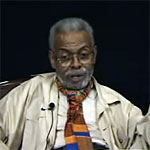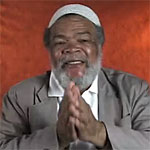Malcolm X, Martin Luther King, and the Civil Rights Movement.
In reaching out to Dr. Martin Luther King, Jr., James Farmer, and other civil rights leaders, Malcolm X proposed a broad coalition of black activist organizations, working in concert to achieve social justice.
ADDITIONAL READINGS:
Malcolm X and James Farmer, “Separation or Integration: A Debate,” in Dialogue Magazine 3 (May 1962), pp. 14-18.
LeRoi Jones, “What Does Nonviolence Mean?” Home: Social Essays, pp. 133-154.
Manning Marable, “Malcolm, Martin and the Mandates of Justice,” Speaking Truth to Power: Essays on Race, Resistance and Radicalism, pp. 134-138.
Robin Kelley, “House Negroes on the Loose: Malcolm X and the Black Bourgeoisie,” Callaloo 21 (2) 1998:419-435.
James Baldwin, “Malcolm and Martin,” Esquire 77 (4) 1972: 94-97, 195-196, 198, 201-202.
James Cone, Martin & Malcolm & America, Chapter 9, “Two Roads to Freedom,” pp. 244-271; Part of Chapter 10, “Nothing But Men,” pp. 272-273, 280-287; Chapter 11, “Making Their Mark: Legacies,” pp. 288-314; and “Conclusion,” pp. 315-318.
The Playboy Interview: Malcolm X Speaks with Alex Haley (May 1963),” in Gallen, ed., Malcolm X: As They Knew Him, pp. 109-130.
“Minister Malcolm: A Conversation with Kenneth B. Clark (June 1963),” in Gallen, ed., Malcolm X: As They Knew Him, pp. 131-134.
Malcolm X, “God’s Judgment of White America,” in The End of White World Supremacy, pp. 121-148.
“Muslims Press Race Separation,” New York Times, February 26, 1963, p. 3.  “X Marks the Spot,” Newsweek, May 6, 1963, p. 28.
“X Marks the Spot,” Newsweek, May 6, 1963, p. 28.  Handler, “Malcolm X Starting Drive in Washington,” New York Times, May 10, 1963, pp. 1, 14.
Handler, “Malcolm X Starting Drive in Washington,” New York Times, May 10, 1963, pp. 1, 14.  Handler, “Malcolm X Terms Dr. King’s Tactics Futile,” New York Times, May 11, 1963, p. 9.
Handler, “Malcolm X Terms Dr. King’s Tactics Futile,” New York Times, May 11, 1963, p. 9.  “Themes and Variations: Coffee with Malcolm X,” Wall Street Journal, May 16, 1963, p. 12.
“Themes and Variations: Coffee with Malcolm X,” Wall Street Journal, May 16, 1963, p. 12.  Handler, “Malcolm X Scores Kennedy on Racial Policy,” New York Times, May 17, 1963, p. 14.
Handler, “Malcolm X Scores Kennedy on Racial Policy,” New York Times, May 17, 1963, p. 14.  “Why Black Muslims Are Focusing on the Nation’s Capital Now,” US News & World Report, May 27, 1963, p. 24.
“Why Black Muslims Are Focusing on the Nation’s Capital Now,” US News & World Report, May 27, 1963, p. 24.  Malcolm X Disputes Nonviolence Policy,” New York Times, June 5, 1963, p. 29.
Malcolm X Disputes Nonviolence Policy,” New York Times, June 5, 1963, p. 29.  Malcolm X, “Muslim Teachings,” New York Times, August 25, 1963, p. SM2.
Malcolm X, “Muslim Teachings,” New York Times, August 25, 1963, p. SM2.  “3 Negro Speakers on TV Hold Kennedy Leadership Inadequate,” New York Times, June 25, 1963, p. 13.
“3 Negro Speakers on TV Hold Kennedy Leadership Inadequate,” New York Times, June 25, 1963, p. 13.  Clayborne Carson, “The Unfinished Dialogue of Martin Luther King, Jr. and Malcolm X,” Souls, Vol. 7, no. 1 (Winter 2005), pp. 12-19.
Clayborne Carson, “The Unfinished Dialogue of Martin Luther King, Jr. and Malcolm X,” Souls, Vol. 7, no. 1 (Winter 2005), pp. 12-19.  George Breitman, ed., Malcolm X Speaks, pp. 3-17.
George Breitman, ed., Malcolm X Speaks, pp. 3-17.







 Max Stanford on the Malcolm's conversations with Dr. King
Max Stanford on the Malcolm's conversations with Dr. King Amiri Baraka on Malcolm's plans to create a "united front" with civil rights organizations
Amiri Baraka on Malcolm's plans to create a "united front" with civil rights organizations Ossie Davis on Malcolm's interactions with the movement
Ossie Davis on Malcolm's interactions with the movement Abdullah Abdur-Raazaq on Malcolm's trip to Africa and reactions to MLK
Abdullah Abdur-Raazaq on Malcolm's trip to Africa and reactions to MLK